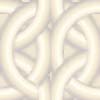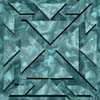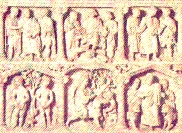

 |
A Review by Gene Hargrove Tales from the Flat Earth is a complex work composed of five volumes, published over a ten-year period: Night's Master (1978), Death's Master (1979), Delusion's Master (1981), Delirium's Mistress (1986), and Night's Sorceries (1987). It is likely that Tanith Lee did not originally envision it as a unified work. When the first three were published, the subtitle for the first and third was An Adult Fantasy; the second, An Epic Novel of Adult Fantasy. The subtitle, Tales from the Flat Earth, first appeared with volume four. It was then elevated to the main title in a hardcover edition of the first three. While it is probably best to read them in order, the second can be read before the first without undue harm, since the stories are largely independent of each other and references in the second to the first are not very important. The fourth, however, is a continuation of the third. The fifth, which takes place at the same time as the fourth, is composed of material that seemingly did not fit into the fourth. |
The collection has the scope of J.R.R. Tolkien's The Silmarillion, in that it covers huge periods of time (sometimes centuries go by between chapters), but has a very different style. Whereas The Silmarillion is supposed to be an ancient text, Tales is part of an oral tradition told by a storyteller. No effort is made by this storyteller to present a realistic tale. Rather her aim is to amaze. She speaks with authority much of the time. At other times, she speculates, thereby filling in gaps in the story, and occasionally casts doubt on the reliability of her tales. For example, in "Duniveh, the Moon," in Night's Sorceries, she remarks: "The rest of the fantastic yarn, they say, he later invented, to cover his nakedness and his embarrassment. But all storymakers are liars, and the world now is round, and not as it was. Who can tell?"
Although Lee uses the term "earth," her flat earth is a middle-earth. Above is Upperearth, the home of the gods, who spend their time sleeping and thinking in a simplified landscape. Below are two realms, Underearth, the home of Azhrarn, Prince of Demons and Prince of Wickedness, and Innerearth, the home of Uhlume, Lord Death. Uhlume's realm is filled with dead spirits, who, because they made bargains with him, are contractually obligated to remain with him for one thousand years. Arhrarn's kingdom, known as Druhim Vanashta, is filled with three classes of demons, over whom Azhrarn rules: the Vazdru, the Eshva, and the Drin. The Vazdru, male and female, are lordly, beautiful demons of the same sort as Azhrarn himself, capable of transforming themselves into animals, particularly eagles. The Eshva, male and female, are dreamy servants of the Vazdru, moody, emotional beings, who speak only with expressions and melancholy sighs. The third, apparently all male, are the Drin, ugly dwarflike beings. They are great craftsmen, who spend most of their time making beautiful things to please their lord. All three groups regularly visit earth, where they cause a great deal of trouble arbitrarily.
Azhrarn and Uhlume, who is not a demon, are two of five Lords of Darkness. The first volume introduces Azhrarn, the second Uhlume, the third, Chuz, Prince of Madness, and the fourth, Kheshmet, King Fate, although he plays a minor role. Throughout the books, Lee keeps the identity of the fifth Lord of Darkness a secret, revealing it only in the last sentence of the final volume.

The structure of Tales is difficult at first to grasp. Night's Master begins on a lonely hillside, where Azhrarn, passing by in eagle form, stops to investigate the weeping of a dying woman, who has just given birth to a son. As she dies of natural causes, Azhrarn engages her in philosophical discussion about the meaning of human life. After the woman expires, Azhrarn, fascinated by the beauty of the child, takes him back to Underearth to raise as his son. Although this child, Sivesh, appears at first to be the main character in the story, he offends Azhrarn and dies by the thirtieth page and for some time thereafter the main character is a necklace of jewels made by a Drin from the tears of Sivesh's wife, Ferazhin. This particular segment, Book One, concludes with a blind minstrel, Kazir, going to Underearth in a dream state to bring Ferazhin back to earth (she was made from a flower brought from earth by Azhrarn to please Sivesh). Book Two continues with the story of Zorayas, the daughter of a cruel king, who survived his overthrow, but was badly disfigured during the escape. After the death of the monk who raised her, she takes vengeance on a passing prince who raped her, and then, with the help of the Drin, takes back her father's thirteen kingdoms. Like her father, she dies through moralistic trickery instigated by Azhrarn. In Book Three, a prank of Azhrarn's on a young married couple leads eventually to a situation in which all of humanity is nearly destroyed by a being derived from the remains of the husband, referred to as "Hatred" by the storyteller. Azhrarn, who, like the other Lords of Darkness, is apparently a creation of the collective unconscious of humankind, after futilely appealing to the gods of Upperearth for help, sacrifices himself to keep humankind alive, afterward resurrecting himself in a bizarre manner.
It is easy to conclude that the book is a collection of short stories in which Azhrarn occasionally appears. Actually, however, Azhrarn is the main character, as the title clearly indicates. From this perspective, it is an account of a series of character changes in Azhrarn, which continue throughout the first four volumes over many thousands of years.

Death's Master begins with the story of Narasen, Queen of Merh. One day while hunting leopards, she is accosted by a magician named Issak, who vows that he will have his way with her that night and that she will not be able to prevent it. Despite her best efforts, the magician succeeds in entering her bed chamber, where Narasen, pretending to be cooperative, manages to kill him by stabbing him through the ear. Before dying, however, he pronounces a curse, according to which Narasen and Merh will both become barren. Although the curse can overcome if Narasen gives birth to a child, the curse includes a provision that prevents this solution: "Your reluctant womb will never quicken from the seed of living man." After endless attempts to conceive a child, Narasen decides to save her land by making a deal with Uhlume through his agent, Lylas, a witch living in a nearby dwelling known as the House of the Blue Dog. In return for helping her conceive a child from a dead man, she will spend a thousand years in Uhlume's kingdom after her death. Unfortunately for Narasen, she dies shortly after childbirth from a poison administered by her doctor on order of the general heading her army (and provided by Lylas, who is jealous of Narasen).
After Narasen is locked in her tomb with her new born child, Simmu, Uhlume comes to claim her, leaving behind the child, who nevertheless is rescued by two passing Eshva, stirred by "great curiosity, a bottomless, limpid desire to meddle in human affairs." For some period of time thereafter Simmu lives with the Eshva by night, developing Eshva abilities, for example, learning how to change gender from male to female and back again at will. Eventually tiring of the child, the Eshva leave Simmu at a temple near Merh, where he grows up among monks and becomes emotionally involved with his only friend, another boy named Zhirem. This young man is the son of a king, who was secretly made invulnerable to all harm by being dunked in a well of fire as part of an arrangement between his mother and a hag, the guardian of the well. When the king became aware of the unusual power of his son, however, he cast his wife out into the desert and sent his son off to be a monk, where perhaps he might eventually be freed of demons. Once they are grown, Simmu and Zhirem become separated during tragic events and misunderstandings at the beginning of their monk apprenticeships and in succession become the tools of Azhrarn and Uhlume respectively in a personal struggle between the two Lords of Darkness, initiated by Azhrarn, apparently on whim. In addition to his struggle with Azhrarn, Uhlume also finds Narasen more than he can handle. Narasen gets permission from Uhlume to spend one day in Merh, where she promptly gets revenge by destroying her city. Upon her return, she gradually takes over the supervision of Innerearth from Uhlume, earning the name "Lady Death." Saving Simmu from Narasen during her raid on Merh, Azhrarn has Simmu carry out a quest to obtain water from a well of immortality, the Cistern of Life, which he came across in Upperearth while seeking aid from the gods in the previous tale. The point of this plot is to eventually kill Death, or Uhlume, by bringing death to an end. To prevent drops of water from the well from ever becoming available to humanity, Lylas, on instruction from Uhlume, creates an elaborate religious center at the site of a second well, designed by the gods to catch any fluid that might drop if the well above should for some reason crack. After many adventures, Simmu infiltrates the Garden of the Golden Daughters as a female and engages in activity that cracks the well, releasing water of immortality, which he and one of the Golden Daughters, Kassefeh, carry away into the desert, and use to establish Simmurad, the City of Simmu, a city of immortal humans.
Meanwhile, Zhirem, who has many adventures of his own, ends up in an undersea kingdom, where magic is different than on the land, and acquires all the magical abilities of that city. Returning to earth as a magician, now named Zhirek, he agrees to serve Uhlume, who wishes to destroy Simmurad, perceiving it to be a danger to his own immortality. Aided by advice from Azhrarn, who has become bored with Simmu, the City of Simmu is buried under the sea with the use of Zhirek's sea magic, and Simmu himself is murdered by Zhirek, who casts his former lover into the well of fire, where he is incinerated. Kassafeh, in the meantime, is saved by Uhlume as a replacement for Lylas, his previous agent on earth, who was killed earlier in a spell reversal while trying to prevent Simmu from reaching the Garden of the Golden Daughters (and who herself becomes a servant of Narasen in Innerearth). The story ends with Narasen ruling Innerearth for all practical purposes and Uhlume spending most of his time on earth consoled by Kassafeh, the new Handmaiden of Death. Zhirek becomes a hermit and Simmu, in the end, is saved by Azhrarn, who turns him into an Eshva and in pity wipes away all memory of his past. Lylas, her treachery toward Narasen revealed, becomes the Blue Dog of Kassafeh's mobile home.

Delusion's Master is the beginning of a much more ambitious narrative, which in its meandering way fills the next three volumes. This volume begins with an introductory tale about Jasrin, the young wife of King Nemdur of Sheve, who, jealous of her newborn child, leaves him in the desert where he is killed by a lion. Appalled, Nemdur banishes his wife to a tower where she becomes completely insane and is soon thereafter visited by Chuz, Prince of Madness, the third Lord of Darkness. Asking Jasrin what she most wishes, she replies that she would like for her husband to become as crazy as she is. The next day Nemdur awakes with a plan to build a tower up to Upperearth, where, inspired by the legend of Simmu, he plans to rest immortality from the gods. The Tower of Babyhelu ("The Gate to the Gods") grows taller and taller until at last it falls overwhelmed by its own weight, bringing about the fall of the kingdom of Sheve at the same time. As the dust clears, a group of demon spectators, led by Azhrarn, attracted by the noise, meet Chuz and discuss Chuz's handiwork. This conversation reawakens Azhrarn's disgust for the gods, who refused to help him in the first volume, because he realizes they will get credit for the fall of the tower, rather than Chuz.
The story picks up hundreds of years later as seven thousand pilgrims dance across the desert to worship the gods at Bhelsheved, the tower where Jasrin was exiled. Each night the pilgrims experience strange happenings. Among these, Azhrarn in disguise as a prophet tells the pilgrims that a demon, a Lord of Darkness, not the gods, is the savior of humanity, and for his trouble he is lashed with a whip, shedding three drops of demon blood. Azhrarn continues his activities in Bhelsheved, but is suddenly diverted by the beauty of a young priestess, Dunizel, who, realizing Azhrarn's intentions, offers to sacrifice herself to avert his wrath. Turning into a wolf, he bites off her lower arm, but hesitates when she holds out the stub and encourages him to bite again. Remembering his own sacrifice to Hatred, Azhrarn changes his mind, heals her with his own blood, and then falls in love with her.
Azhrarn becomes involved with her because she is actually a unique human, partially of extraterrestrial origin. Her mother was a village idiot who was held prisoner by an assistant to an astronomer-mage, who was on a field trip to make observations of a comet as it passed very close to the earth. After getting the girl pregnant, the assistant sought to abort the child by exposing her to the comet's effect as it passed overhead. To the contrary, the girl, who was bathed in a rainbow of light captured by the mage with his magical engine, gained sanity for the first time and gave birth to a child also affected by the comet's light. Thereafter, the mother, Sunfire, lived with the reformed assistant, raising the child, until she slowly transformed into a fire elemental and flew off into the sky. Shortly thereafter the now kindly assistant gave up his own child, Dunizel, to a grieving mother from the nearby village who lost her child in a drowning accident. The child was raised by her new mother until she was involuntarily selected to join the religious cult.
Falling in love with Azhrarn, Dunizel gives birth to a child, Azhriaz, who is at first taken to be a god on earth. Through machinations of Chuz, however, the fatherhood of the child is revealed and Dunizel is killed by a mob (hit by one of the drops of Azhrarn's blood, originally shed in the desert). Azhrarn takes the child to Underearth in defeat and despair, but before he departs, he speaks with Chuz: "You and I, . . . un-brother, un-cousin, are now also un-friends" and "There is a war between us. . . . And I have done you the kindness of informing you." The volume concludes with Chuz finding Jasrin, who has been haunting her tower, and releasing her from her torment.

Delirium's Mistress begins in a confusing manner. There is no war. Azhrarn is not looking for Chuz. Instead, the storyteller focuses on Oloru, a court jester to a tyrannical magician-prince, Lak Hezoor. Groveling and humiliating himself, and putting his mother and sisters in danger, Oloru convinces Lak Hezoor to take him to Underearth for a sightseeing tour of Azhrarn's kingdom. After Lak Hezoor is torn to pieces by Azhrarn's red hounds, Oloru, who arrived as a topaz die, turns into "a slender rod of yellow radiation, vaguely purplishly limned" and flies toward an island where Soveh Azhriaz, daughter of Azhrarn and Dunizel, now a young adult, has been lying, tended by the Eshva, in a somnambulist slumber since her arrival in Underearth. Oloru, actually Chuz in disguise, arouses Sovaz, convinces her to escape, and flees with her back to earth, where the two become lovers. It is at this point that Kheshmet, King Fate, enters the story cryptically on his "own kingly business." Shortly thereafter Azhrarn arrives and ends his quarrel with Chuz: as penance, Chuz agrees to live a mortal lifetime without his powers as a disfigured idiot.
Thus deserted by Chuz, Azhriaz wanders the earth in despair, in passing, dealing harshly with a city of ghouls. That done, she visits her mother's grave with Khesmet and decides to be her father's daughter, carrying out the original purpose of her birth: the discrediting of the gods. Replacing King Qurob of Nannafir, who cuts his own throat to avoid a curse, Azhriaz becomes a goddess on earth. After conquering much of the world, she sets about teaching human beings that the gods care nothing for them (that they are "cruel and pitiless and indifferent" to humanity): "Remember, to the gods you are nothing. To Azhriaz, the Goddess, you are only grains of dust or sand." At this point, Zhirek, the murderer of Simmu, returns to the story, as Dathanja, from out of a block of stone, in which, it appears, he has been encased throughout the entirety of Delusion's Master. After Dathanja wanders away as a madman, Khesmet arrives to warn of a coming war with sea and sky.
This war begins when a god, whom Azhrarn kissed on the eye in volume one, awakes and decides that something needs to be done about that and what Azhrarn's daughter is doing on earth. To conduct their war, the gods throw three invisible shards into the sun transforming them into three angels, warrior-priests of the gods, the Malukhim: Ebriel, Yabael, and Melquar. Azhrarn arrives to hold the angels at bay as Azhriaz escapes into the ocean in a special fish-ship devised for her by the Drin, but pursued by Ebriel and Yabael. Azhrarn struggling in the air with Melqar is nearly incinerated before making his escape. The city of Az-Ninnafir, however, is vaporized. For a time Azhriaz is held prisoner in the underwater city of Tirzom Jums, from which she escapes when Yabael levels the city with his sword. Azhriaz receives no help from Azhrarn because he lies in a death-like coma in Druhim Vanashta and has been usurped by a subordinate demon, Hazrond. Eventually, however, Azhrarn recovers and takes back his kingdom. As for Azhriaz, she is chased by Yabael past Simmurad into chaos over the World's Brink. Yabael is transformed and forgets his mission. Azhriaz's ship is destroyed and she survives but as a child. Followed by Ebriel, she travels with Dathanja (Zhirek) slowly growing back into adulthood. Once back to full size, as Atmeh, she battles Ebriel. Finding herself locked in eternal battle, she convinces Ebriel to stop by revealing her plan to renounce her immortality and become a human being.
When Ebriel departs, Atmeh seeks out Kassafeh and makes a bargain with Uhlume (who is about to retire by abdicating to Narasen) to become a mortal and achieve a mortal death. Briefly reunited with Chuz, who has paid his penance, Atmeh becomes a mortal woman. After two or three centuries, as Atmeh nears death, she is visited by Azhrarn, her fourth "son," who tells her: "Humanity is my plaything no longer, only a toy for those that are mine under the earth. But you, you are her child. You are hers. You are Dunizel. Not mine. Never mine. Though I made you to be my curse upon the world. Though I made you to be myself. You are Dunizel, that I loved, Dunizel who was the moon and sun together." Azhrarn laments that he cannot cry. Azhriaz responds: "Each word you have spoken was a tear."

Although seemingly the final volume, Delirium's Mistress was followed one year later by a fifth volume, Night's Sorceries. On the surface, this book is a collection of short stories, loosely related to the previous volume, since they take place at roughly the same time. Each is introduced with a note explaining the temporal/spatial relationship. "The Prodigal" provides some insight into Narasen's reign as Queen Death, after Uhlume's abdication. "Dooniveh, The Moon" is a marvelous story, almost a fairy tale, about a monk from Nannafir, who flies to the moon on a winged horse and has many strange adventures leading up to the wedding of the Moon Queen and the Sun King. The horse was a gift from Hazrond to Azhriaz when he courted her before the fall of Nannafir. The final tale, "The Daughter of the Magician," recounts the story of a mage who resurrects the soul of Azhriaz. Though successful with the resurrection, his overall plot fails and the child, Ezail, ends up as a sacrifice to a monster, created as the counterpart of the winged horse in "Dooniveh, The Moon." Recognizing the creature as an undelivered part of Hazrond's gift, she regains her memory of self and reunites with Chuz, who happens by in the reincarnation of a young boy named Chavir. Taking their monster with them, they elect to live out the game of love and the game of death once more.
As the last line of Night's Sorceries suggests ("Love is also an immortal"), Azhriaz is one of the Lords of Darkness. This conclusion is not entirely unanticipated. In Delusion's Master, Azhrarn tells Dunizel that her child will be "the feminine principle of Azhrarn, Prince of Demons, Night's Master, one of the Lords of Darkness." Although there is some ambiguity here, this sentence could be interpreted to mean that she will be "one of the Lords of Darkness," rather than merely the feminine principle of "one of the Lords of Darkness." The mystery of love, moreover, is highlighted in the conclusion of Delusion's Master: "Love is everywhere and the death of love. . . . And time, which is built of the histories of death and love. Death and time I concede and acknowledge. . . . But what . . . is love?" In Delirium's Mistress, Azhrarn offers a tentative, but false answer: "There is no such commodity. There is carnality, our plaything. There is worship, and there is obsession. Death you may see walking the world, and Fate, and Delusion, too, in a form that I have kindly lent him. But no man sees love, and no demon sees it." Interestingly, the elevation of Love to the status of a Lord of Darkness sheds light on the role of Hatred, Love's opposite and therefore a potential Lord of Darkness himself. Lee as the storyteller notes on many occasions that Lords of Darkness refuse to go to war with each other beyond certain limits. So as not to go too far, Azhrarn aids Uhlume in the destruction of Simmurad and Chuz agrees to do penance to Azhrarn. In this context, the destruction of Hatred can be seen as a necessity, given that Hatred aimed at the destruction of humanity, upon which all of the Lords of Darkness depend for their existence. Viewed in this way, the theme of the series as a whole is not simply the introduction of one more Lord of Darkness but the establishment of a new one, who performs a regulatory function with regard to the others - Wickedness, Death, Delusion, and Fate - Azhriaz's four "sons" in the final chapter of Delirium's Mistress.
Because of the complexity of Tales, it is difficult to see the forest because of the trees. The overall theme, nevertheless, is of little significance when reading the books, and can be ignored, since the beauty of the series is not in its themes or in its structure, but rather in its detail and humor. As in all storytelling, it is the way the story is told that makes all the difference.
For those who don't want to launch into a story comparable in length to The Lord of the Rings, there are a few one-volume books that can serve as samplers: Volkhavaar (1977), East of Midnight (1977), and most recently Black Unicorn (1991). Bear in mind, however, that Lee writes in a variety of styles and genres - fantasy, science fiction, and horror. In her most recent work, The Secret Books of Paradys, she is focused on horror in the context of what appears to be the French Revolution.

You are visitor number
since October 5, 1996.